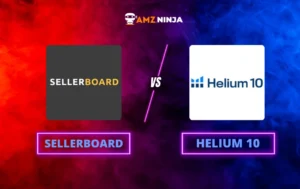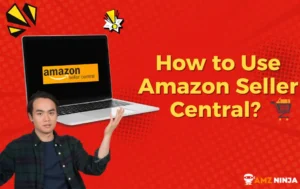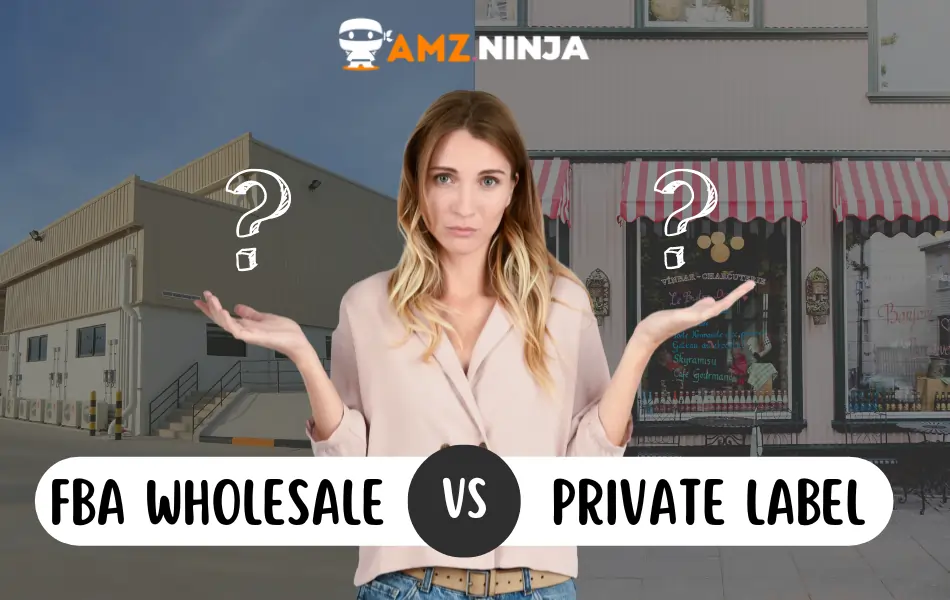
You're an ambitious entrepreneur, eager to conquer the vast realm of Amazon selling. But as you stand at the crossroads of FBA Wholesale and Private Label, you can't help but wonder – which path will lead you to greater riches?
In this guide comparing FBA Wholesale vs Private Label, we'll look forward to the tapestry of these two business models, covering each and every aspect of which model should be your go-to choice.
FBA Wholesale Vs Private Label
| Aspect | FBA Wholesale | Private Label |
|---|---|---|
| Product Sourcing | Source products from brands/distributors | Source generic products and add your own branding |
| Branding | Sell established brand-name products | Create your own brand identity |
| Product Control | Limited control over product design/quality | Full control over product design and quality |
| Competition | Compete with other sellers of the same brand | Potentially less competition for your unique brand |
| Profit Margins | Generally lower profit margins | Potential for higher profit margins |
| Barrier to Entry | Easier to get started by reselling brands | Higher startup costs for branding, packaging, etc. |
| Scalability | Scalable by adding more brands/products | Scalable by expanding your product line |
| Marketing | Leverage existing brand awareness | Need to build brand awareness from scratch |
| Buy Box | Compete for Buy Box with other sellers | Likely to own the Buy Box for your products |
| Risk | Lower risk by selling proven products | Higher risk in creating and launching new products |
Amazon FBA Wholesale
FBA Wholesale is a business model where sellers purchase products in bulk directly from brands or distributors at discounted wholesale prices, and then resell those products on Amazon using the Fulfillment by Amazon (FBA) program.
Sellers ship their inventory to Amazon's warehouses, and Amazon handles storage, picking, packing, and shipping to customers.
Requirements for Selling on Amazon as a Whole Seller
To sell on Amazon as a wholesaler, you typically need a business license, sales tax permit or resale certificate, EIN number, and approval from brands to resell their products. Building relationships with suppliers and negotiating favorable terms is also crucial.
Furthermore, wholesale sellers are typically responsible for managing their own inventory, whether by fulfilling orders themselves or by Amazon's Fulfillment by Amazon (FBA) service. With FBA, sellers can send their wholesale products to Amazon's fulfillment centers, where Amazon will handle storage, packing, and shipping to customers.
Another key aspect to consider is that wholesale sellers do not need to create new product listings on Amazon. Instead, they can add their offer to an existing product listing, provided that the product matches exactly. This can save time and resources, as creating and optimizing listings can be a significant undertaking.
According to Jungle Scout, approximately 25% of third-party sellers on Amazon utilize the wholesale sales model, which underscores the significance of this selling strategy within the marketplace.
Amazon wholesale offers a viable path for sellers to leverage existing brands' popularity and streamline their sales process by adding offers to existing listings. However, it requires careful consideration of legal prerequisites, inventory management, and the strategic use of Amazon's fulfillment options to succeed.
Benefits & Drawbacks of Amazon FBA Wholesale Model
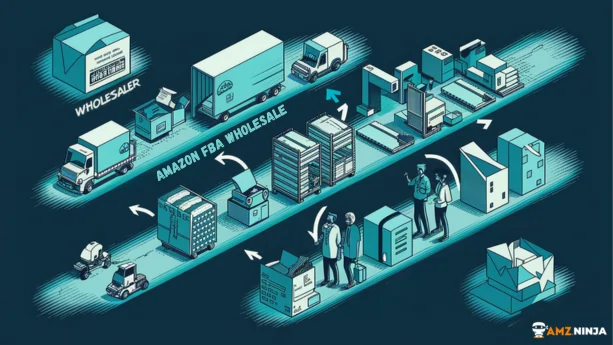
The Amazon FBA (Fulfillment by Amazon) wholesale model presents an opportunity for sellers to leverage Amazon's extensive reach and fulfillment prowess. Here, we explore the benefits and drawbacks of adopting the FBA wholesale approach to help sellers make informed decisions.
Benefits of FBA Wholesale
Drawbacks of FBA Wholesale
Amazon Private Label
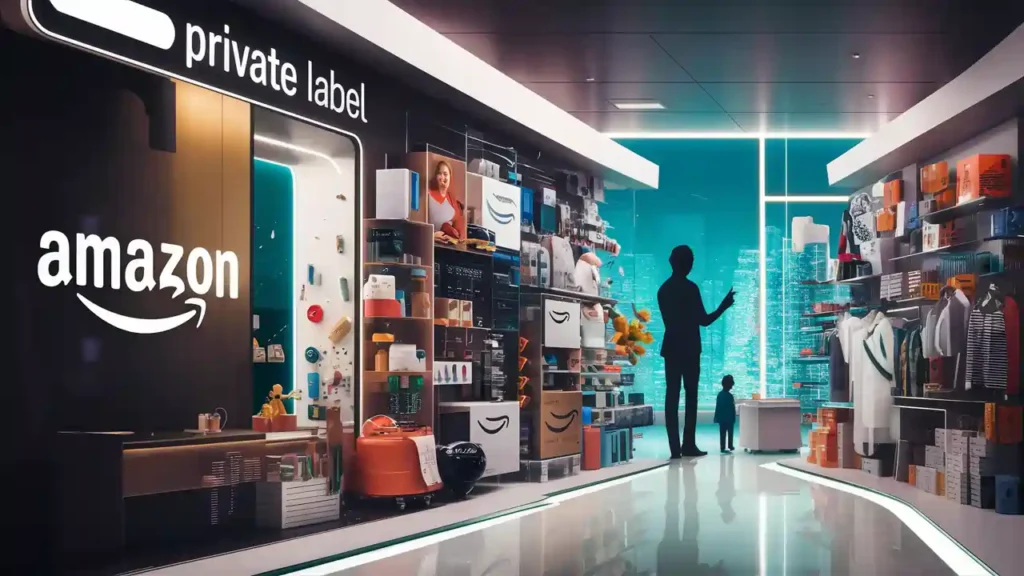
The Amazon marketplace offers various avenues for sellers to establish their brand presence. One such avenue is the private label sector, which has garnered significant traction among sellers aiming to create niche brands.
Definition of Private Label on Amazon
Amazon Private Label refers to creating and selling your own branded products on Amazon's platform. Instead of reselling existing products from other brands, you source generic products from manufacturers and rebrand them under your own private label. This allows you to have full control over the product design, branding, packaging, and pricing.
With private labels, you can differentiate your offerings, build brand recognition, and potentially achieve higher profit margins compared to reselling other brands. However, it also requires upfront investments in product sourcing, branding, and marketing to establish your private label brand on Amazon's marketplace.
Well-known examples of private label brands include Walmart’s Great Value, Target’s Mainstays, and Amazon’s own Amazon Essentials, highlighting the widespread adoption of this model across major retail platforms.
Benefits of Private Label on Amazon
The allure of the private label model on Amazon lies in its numerous benefits:
Utilizing Amazon’s Fulfilled-by-Amazon (FBA) program can further enhance these benefits by providing the necessary logistical support and tools to help sellers succeed.
Furthermore, sellers can gain inspiration for private label products by exploring trending items, monitoring social media, and platforms like Kickstarter and IndieGoGo for innovative product ideas that have not been adopted by major retailers yet.
Factors to Consider Before Choosing FBA Wholesale or Private Label
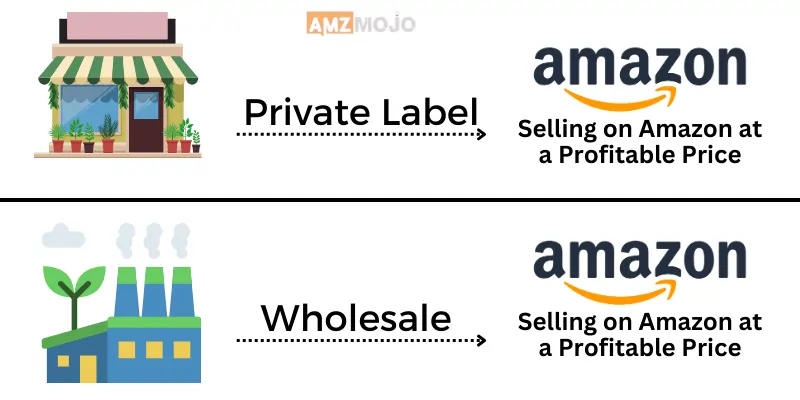
Choosing between Amazon FBA Wholesale and Private Label requires a thorough understanding of each model's nuances and how they align with your business objectives and resources.
When comparing Amazon FBA wholesale with private label, there are several critical factors to consider:
- Initial Investment: Private labeling typically requires a more substantial upfront investment for product research, manufacturing, and marketing compared to wholesale, where the products are already established and recognized.
- Brand Control: Private label sellers have complete control over their brand, product, and packaging, allowing for customization and differentiation. In contrast, wholesale sellers are limited to selling existing brands with predetermined brand guidelines.
- Risk: Wholesale selling involves less risk since the products are already known and accepted in the market. Private-label products carry more risk in terms of market acceptance and the potential need for more extensive marketing efforts.
- Profit Margins: Private label sellers can potentially enjoy higher profit margins due to the unique branding and value proposition of their products. Wholesale margins are typically thinner, as the market sets pricing standards for known brands.
- Set-Up Time: It is usually quicker to start selling as a wholesale vendor on Amazon as opposed to launching a private label product, which can involve lengthy product development and marketing strategy phases
- Competition: While wholesale allows access to established brands, competition among sellers can be fierce. Private label products can stand out if they offer a unique selling proposition but may face competition from similar private labels and established brands.
- Market Research: Private label sellers need to conduct in-depth market research to ensure their product meets a need not currently met by existing products. Wholesale sellers focus on market research to identify the best brands and products to sell.
- Operations and Sales Optimization: Success in Amazon FBA wholesale hinges on efficient operation management and sales optimization. Conversely, private label success is driven by effective branding and marketing, alongside product quality.
Making the Right Choice
To determine the most appropriate business model for your Amazon venture, align your decision with your business goals, financial capacity, risk tolerance, and the level of control you desire over your product and brand.
For Established Brands With Lower Risk
If you seek to capitalize on existing market demand with lower risk and have limited resources to invest in brand development, Amazon FBA Wholesale may be the better option.
For Brand Development and Higher Profit Margins
If you aim to build a brand and have the resources to support product development, marketing, and higher upfront costs, Private Label could offer more significant long-term rewards.
Quenching Questions Related to Whole FBA and Private Label
What is the difference between Wholesale FBA and Private Label?
Which Seller Model Offers Higher Profit Margins?
Which Seller's Model Has Lower Risk?
Which Model Allows More Control Over Branding?
Which Amazon Model Scales Better?
Which Model Will You Choose?
Consider the scalability of each model and how it fits into your long-term vision.
Do you envision a portfolio of unique products, or do you prefer the simplicity of selling proven commodities?
Evaluate the market dynamics and potential for growth in your chosen niche for both wholesale and private-label products.
Ultimately, the decision between Amazon FBA Wholesale and Private Label is not a one-size-fits-all situation. It requires a strategic approach based on your specific circumstances and the market landscape.
Take the time to analyze each model's pros and cons thoroughly, and choose the path that best aligns with your business acumen and aspirations.




